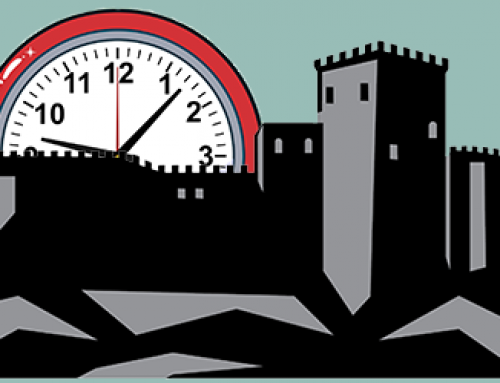The battle is real.
You want to be organized and dependable, you want to have your to-do list and your calendar and even your notes all in one space and feel like you have more control over it. You want that feeling of accomplishment when you cross something off your list—which is not that easy to feel these days.
It was supposed to be the planner that would change your life.
If you’re like most of us, you probably have more than one planner; more than one system to track your tasks and appointments and hoped that this planner would be the one that would change your life—only to abandon it a few weeks later. You’re not alone.
Whether you stuck with a planner for a week or just a few minutes, there are perfectly reasonable explanations why you experience plannerfail. Let’s explore why, and as a tip, keep this in mind: realistic expectations and a little consistency can get you back on track.
Are you making plans that aren’t realistic?
Cut yourself some slack. Planning to be productive every second of every day is a formula for failure because you’re trying to cover up your insecurities with productivity.
You think that if you can just do more, then you can be more, and you’ll finally feel like you’re good enough. The only problem is that unrealistic planning only creates more evidence to support your negative self-beliefs and you become less willing to put yourself out there.
You then find yourself stuck in a rut—too scared to make realistic plans (because even if you do achieve them, you still won’t be good enough) and too scared to attempt your unrealistic plans and fail. CEO Keith Norris has been warning us about the cycle of goal-setting dysfunction for years. Watch his presentation here.
Do you want everything to be perfect first?
Here’s the reality about planners: They aren’t going to look like the ones you see on Pinterest and Instagram, and they aren’t supposed to!
It’s one thing to use fancy gel pens to make it fun—it’s another matter entirely if you spend hours designing each page and teaching yourself the art of calligraphy. How you use your planner should be sustainable, meaning that it’s easy enough to do—even on a bad day.
If you’re incapable of continuing with an imperfect plan and imperfect results, aspiring to perfection will hold you back because there will always be disruptions and unforeseen events.
Do you expect to feel motivated?
If you plan for the version of you that is motivated, you will not achieve your goals. If you plan for the version of you that is determined to stick to their plan no matter what, you’ll achieve your goals. Successful people do not rely on motivation, they rely on determination.
Do you think you can remember things in your head?
If you’re like most people, you think you can remember things in your head. That doesn’t reflect reality. Studies have shown that humans can only remember a handful of items at a time, and the more complex the information, the less we can remember.
This is why it’s so important to use a planner to keep track of your schedule and commitments. Not only will this help you stay on track, but it will also give you context so that you can better understand what’s going on.
Is it needlessly complex?
The most complicated planner isn’t necessarily the best planner for you. Sure, a habit tracker, vision board, yearly goals, and a mood tracker could all be very useful to have! But if your planner is a lot of work to keep up with, you’re probably not going to stick with it.
Just because you can benefit from something, doesn’t mean you’ll follow through. Don’t let the bells and whistles distract you from what you need!
Are you solving for the wrong problem?
Ask yourself why do you need a planner? If the answer is “to get more organized,” you’ll have to be more specific than that. What problems are you trying to solve? A lack of structure or routine in your day? Not knowing where the time goes? Forgetting important events or appointments?
A lot of people start planners hoping to address their general discomfort with life, rather than a specific problem. We look for the rush of having a solution without considering the problem more deeply. Not exactly a winning strategy!
Is it synced with other areas of your life?
You might be several systems or planners. The problem is, you forget what information lives where, and you update them sporadically because there’s so much to keep up with… suddenly, we don’t have an organizational system at all! Instead, we have a headache.
Be intentional about where all your information lives. The fewer containers, the less there is to juggle! Just one planner will be more than enough to capture everything you need to. Eliminate any unnecessary apps, calendars, sticky notes, or notebooks if you can.
Do you feel planning takes too much time?
You may stop planning when you think it requires you to check it and write in it for hours a day. But an effective planner shouldn’t take more than 10 to 15 minutes a day.
If you plan your day, you’ll save time in the long run. Try to make an appointment with yourself every day to plan out your day. Write down what you need to get done tomorrow. Forget all the other things like goal planning, habit tracking, or sleep tracking for now. If you only have so much time, try just making a list for tomorrow.
Do you get discouraged when you don’t see immediate change?
What might be happening is that you’re scared of wasting effort and you tell yourself the story that effort is only “worth it” if you get a result.
But this mindset will hold you back for more than one reason. If you fear wasting effort, you’re missing an opportunity to learn and go. Effort is valuable in and of itself. But not only that, if you are willing to put in the effort you will most likely achieve the result even if it takes longer than expected.
Can you predict the future?
Not the distant future—maybe something a lot closer. Can you predict how things will be better in your life two weeks from now? The most reliable way to predict the future is to create it.
That’s exactly why we offer a free 14-day trial of our PlanPlus Online planner-organizer! With PlanPlus Online, you can easily gain an extra hour a day through simple planning and organization.
Have a personal transformational experience over the next two weeks by test-driving your own fully functional planner.





